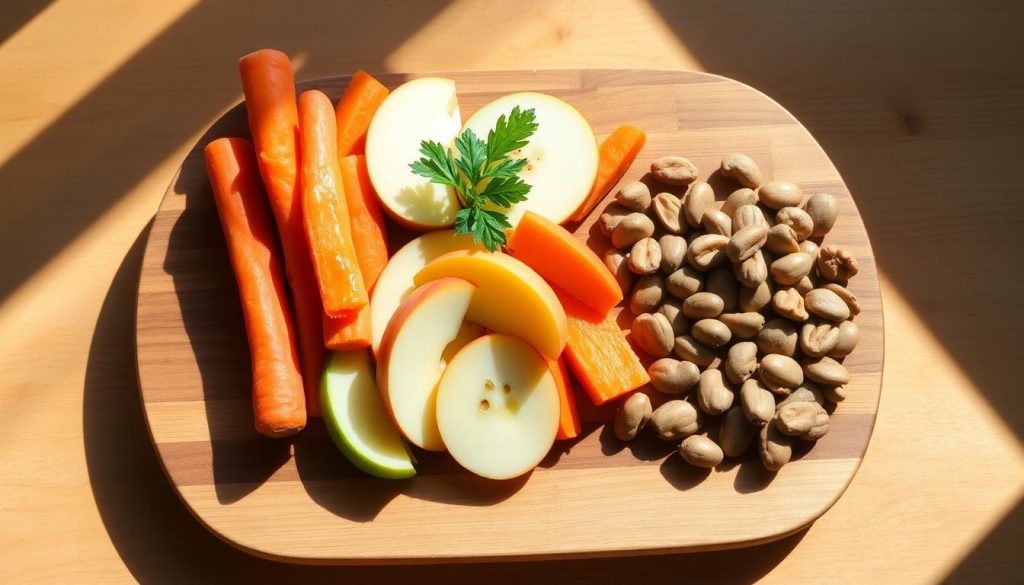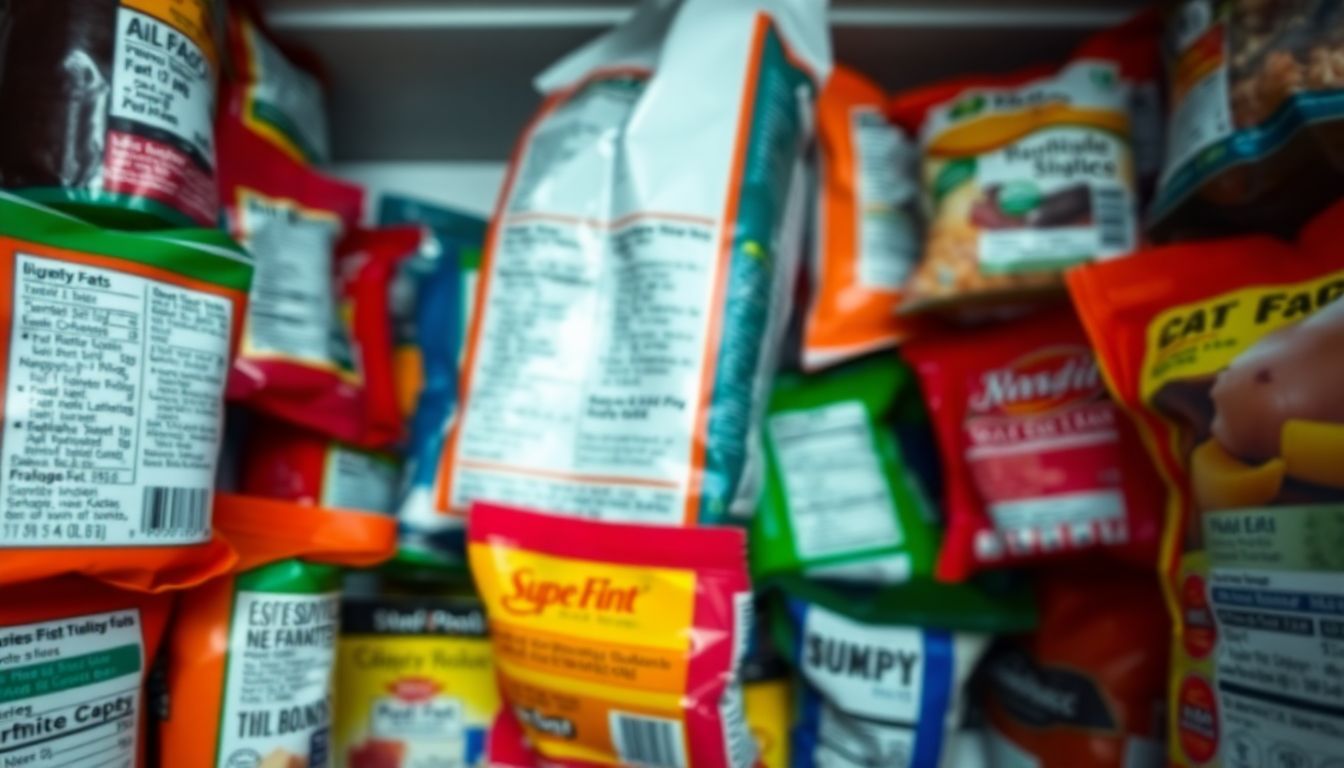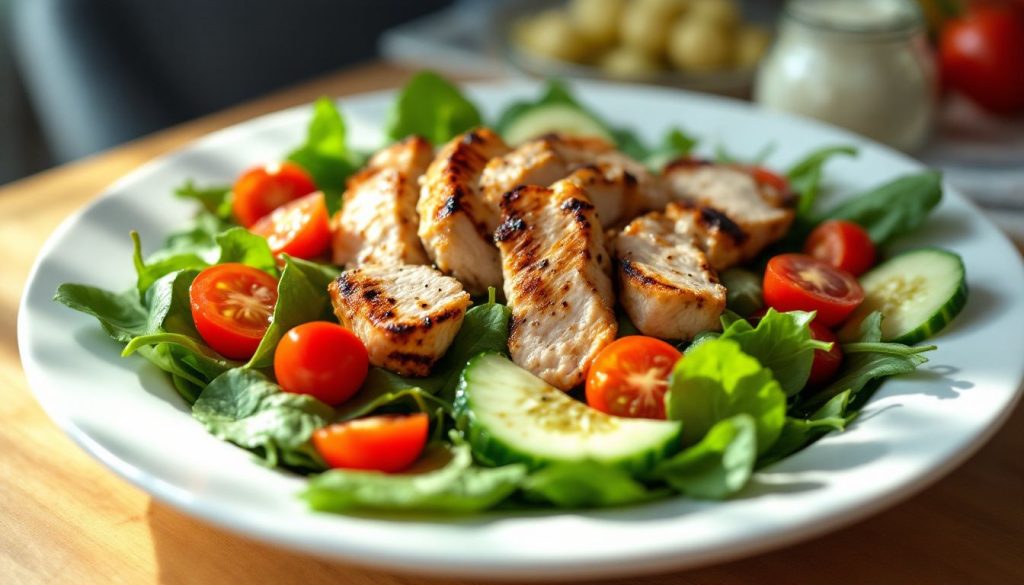Are you eating too many highly processed foods without realizing it? Over 70% of the U.S. food supply is made up of ultra-processed products. This blog will show you how to spot these foods and replace them with healthier options like whole grains, fresh fruits, and minimally processed meals.
Thank you for reading this post, don't forget to subscribe!Keep reading—you deserve better meals for a healthier life!
Key Takeaways
- Over 70% of U.S. food supply is ultra-processed, linked to health risks like heart disease, diabetes, and cancer.
- Avoid harmful ingredients such as high-fructose corn syrup, hydrogenated oils, added sugars, and artificial sweeteners.
- Swap processed foods with whole grains, fresh produce, lean proteins, and homemade meals for better health.
- Prep meals in advance and shop smart by focusing on minimally processed foods while avoiding impulse buys.
- Healthy lunch ideas include using whole grains like quinoa or farro, fresh veggies like spinach or tomatoes, and lean proteins like grilled chicken.
Identifying Ultra-Processed Foods
Ultra-processed foods often hide behind long ingredient lists and unfamiliar terms. Learning to read nutrition labels carefully can help you spot them easily.
Common ingredients to avoid
Watch out for harmful ingredients common in highly processed foods. These additives can harm your health over time.
- High-fructose corn syrup – Found in sugary drinks, baked goods, and snack foods. It adds unnecessary calories and increases the risk of type 2 diabetes.
- Hydrogenated oils – Used in fast foods and processed meats to extend shelf life. They are high in trans fats, which contribute to heart disease.
- Artificial sweeteners – Common in diet sodas, sugar-free snacks, and breakfast cereals. They may lead to digestive issues like inflammatory bowel disease.
- Refined grains – Labeled as “wheat flour” or “white flour.” These lack fiber, bran, and germ, offering little nutritional value compared to whole grains.
- Emulsifiers – Found in ready-made meals and frozen desserts. These harm gut health by disrupting the balance of good bacteria.
- Food dyes – Frequently added to candies, juices, and flavored yogurts for color appeal. Many are linked to hyperactivity and other mental health concerns.
- Anti-foaming agents – Present in some processed milks or chicken nuggets but rarely used in home cooking.
- Added sugars – Appear as molasses or barley malt on labels. Excessive consumption causes weight gain and increases the risk of chronic diseases like colon cancer.
- Dough conditioners – Seen in breads made with white flour or fast-food buns to improve texture but may irritate sensitive stomachs over time.
- Saturated fat – Hidden in deli meats like salami or fatty burgers that raise cholesterol levels—leading to heart disease risks if eaten often.
Keep an eye on nutrition labels for these problematic ingredients!
How to spot ultra-processed foods on labels
It’s easy to miss ultra-processed foods on labels. These products often hide behind long ingredient lists and confusing terms.
- Scan for additives like artificial flavors, colorings, or emulsifiers. These are common in highly processed foods.
- Check the ingredient list for items you don’t recognize or can’t pronounce. Long, complex formulations are red flags.
- Watch out for added sugars using names like corn syrup, dextrose, or maltodextrin. They’re often found in baked goods and ready-made meals.
- Look for a lack of whole food ingredients like whole grains, bran, or fresh produce in the list.
- Use tools like Open Food Facts to scan barcodes and identify ultra-processed options fast.
- Identify cheap fillers such as refined oils or starches that boost calories without nutrition value.
- Pay attention to terms associated with food processing like enriched flours instead of whole wheat or sprouted grains.
Spotting these signs can help limit processed foods from your diet while improving healthy eating habits…

Health Risks of Ultra-Processed Foods
Ultra-processed foods can harm your health in many ways. Eating these often may raise the risk of serious illnesses like heart disease or chronic conditions.
Impact on physical health
Eating highly processed foods often raises the risk of heart disease and type 2 diabetes. Studies show a 1.50 higher risk for heart-related deaths and a 1.12 increase in chances of developing diabetes with regular consumption.
These foods, packed with added sugars, saturated fat, and food additives, strain the body over time.
Excessive intake is also linked to certain cancers like rectal cancer. Diets high in these foods can lead to weight gain or difficulty managing weight. Processed meats such as deli meats or chicken nuggets may further raise health risks due to harmful ingredients used during production.
Opting for minimally processed alternatives promotes better physical health long-term!
Mental health considerations
Ultra-processed foods don’t just harm your body—they can affect your mind too. Studies show consuming these highly processed foods may raise the risk of anxiety and depression by 20 to 50%.
Ingredients like added sugars, unhealthy fats, and food additives disrupt brain health over time. These harmful effects are linked to both poor nutrition and inflammation caused by such diets.
Switching to a healthier eating pattern can help. Research highlights that following a Mediterranean diet reduces depression risks, especially in men. This diet includes whole grains, lean meats, fresh fruit, vegetables, and healthy fats like olive oil.
Unlike ready-made meals or fast foods filled with saturated fat, these nutrient-rich options support mental well-being while keeping cravings under control.

Healthier Alternatives to Ultra-Processed Foods
Swap processed foods with simpler, fresh options. Choosing natural ingredients can boost flavor and nutrition while supporting a healthy lifestyle.
Whole foods and fresh produce
Fresh produce and whole foods help build a healthy diet. Fruits, vegetables, legumes, and nuts are minimally processed options packed with nutrients. They lower risks of heart disease and chronic illness while keeping your meal balanced.
Frozen vegetables work great too! They keep most nutrients thanks to minimal processing like freezing. Swap out sugary snacks for fresh fruit or plain yogurt to cut added sugars. Choose whole grains like Ezekiel bread or overnight oats over highly processed baked goods for more fiber and less saturated fat.
Homemade meal options
Cooking meals at home helps cut ultra-processed foods. Swap sweetened cereals for plain oats topped with fresh fruit. Make baked goods with whole-grain flour, reducing added sugars and unhealthy fats.
Stir-fry frozen vegetables with lean proteins like chicken breast. These simple steps give you more control over food additives and nutrition facts.
Skip bottled soda by making homemade drinks like sparkling water mixed with freshly squeezed juice. Prepare soups or stews using minimally processed foods instead of canned ready-made meals filled with sodium and preservatives.
Fresh options allow better portion control while sticking to a healthy eating pattern….
Practical Tips for Reducing Ultra-Processed Foods
Cutting back on processed foods can feel tricky at first, but small changes make a big impact. Focus on simple swaps, like fresh fruit instead of sugary snacks or frozen vegetables over canned ones with additives.
Meal prepping strategies
Wash and chop fresh vegetables at the beginning of the week. Blanch some to save time when cooking later. Cook grains like quinoa, rice, or whole grains in bulk and store them in airtight containers.
Prep proteins such as chicken breasts, ground turkey, or lean cuts of beef by marinating or pre-cooking small portions for quick use.
Batch cook soups, stews, or casseroles that freeze well for ready-made meals on busy days. Label each container with contents and dates to track freshness. Stay flexible—adjust recipes based on cravings or dietary needs during the week.
Experiment with new healthy food ideas while keeping nutrition goals in mind… It’s just as important as grocery shopping smartly!
Smart grocery shopping habits
Plan your meals for the week. Write a shopping list based on this plan to avoid highly processed foods and impulse buys. Stick to budget-friendly options like store-brand products or items from the world food aisle.
Shopping during discount hours can save money too.
Never shop while hungry—it increases cravings for convenient food like deli meats, chicken nuggets, and fast foods. Focus on whole grains, fresh fruit, frozen vegetables, and minimally processed foods instead of ready-made meals packed with added sugars or saturated fat.
Up next: healthy lunch ideas!

Healthy Lunch Ideas: How to Make Your Lunch a Nutritious Meal
Making a nutritious lunch doesn’t have to be hard. With the right ideas, you can enjoy meals that are both healthy and tasty.
- Use whole grains like farro or quinoa for salads. They add fiber and keep you full longer. A warm farro salad with pomegranate is a great option.
- Include fresh produce in every meal. Kale, spinach, or tomatoes add vitamins and color to your plate.
- Add lean proteins like grilled chicken or turkey. These provide energy without adding too much saturated fat.
- Try plant-based meals for variety. A kale ricotta salad paired with roasted vegetables offers flavor and nutrients.
- Pack Greek yogurt as a side dish or dip. It’s high in protein and pairs well with cucumbers or carrots.
- Swap deli meats for roasted chicken breast slices in sandwiches. Deli meats often have added sugars and preservatives.
- Make homemade wraps using whole-grain tortillas instead of ready-made meals like burgers or chicken nuggets.
- Prepare snacks with nuts, seeds, and fresh fruit on the side of your meal for a balanced diet.
- Use frozen vegetables to save time while still ensuring you get valuable nutrients during lunch prep.
- Experiment with Mediterranean flavors by adding olives, hummus, or roasted almonds to your dishes.
Each idea keeps your lunch simple yet nutritious while reducing ultra-processed foods from your diet effectively!
Conclusion
Eating less ultra-processed food can improve your health. Small changes, like swapping deli meats with fresh options or trying whole grains, make a big difference. Focus on simple, fresh meals to feel better and stay healthy.
Your body will thank you for it! Healthy eating doesn’t have to be hard—start today!
